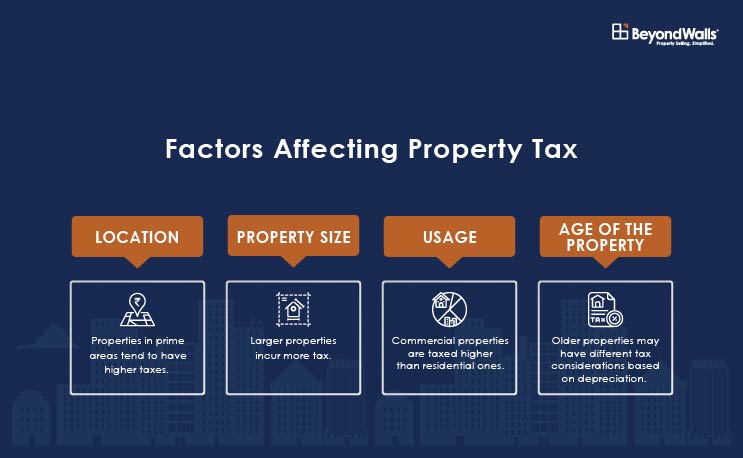Everything You Need to Know About Property Tax in India: From Assessment to Payment

Have you ever wondered how your local government manages to maintain parks, roads, and public services throughout the year? The answer lies in the property taxes you pay. Property tax in India is a vital financial tool that empowers local municipalities to fund essential civic amenities and infrastructure projects. This tax, applicable to all tangible real estate assets, is not just a duty but a significant contribution to community well-being.
This guide delves deep into the nuances of property tax, from its fundamental principles to the detailed processes of calculation and payment. You’ll learn about the various types of property taxes, explore methods like the Annual Rental Value (ARV), Capital Value System (CVS), and Unit Area Value System (UAV), and understand the legal frameworks that underpin these charges. We’ll also cover exemptions, rebates, and the all-important aspects of how to pay your taxes efficiently and on time.
By the end of this blog, you will be equipped with all the knowledge necessary to navigate the complexities of property tax in India, ensuring you can manage your obligations with confidence and accuracy.
-
What is Property Tax?
Property Tax in India serves as a fundamental revenue source for municipal bodies, enabling the development and upkeep of essential public services such as roads, schools, and emergency services. This tax, levied on property owners, plays a crucial role in sustaining local infrastructure. As property owners, understanding calculating property tax is vital to ensuring compliance and supporting your community effectively. This guide will also outline how to pay property tax in India, simplifying the process for taxpayers.
- Legal Basis
The collection of property tax is constitutionally sanctioned under the Municipal Act, which empowers local bodies to assess and collect taxes from property owners within their jurisdiction. This legal framework ensures that tax collection aligns with the needs of local governance and development.
- Legal Basis
-
Types of Property Taxes in India
Central and State Variations:
Property tax regulations can vary significantly across different states and municipalities in India. Each local body may adopt a tax system that best suits its infrastructure needs and financial strategies, leading to a diverse landscape of property tax laws across the country.
For property tax assessment, properties in India are classified into four categories:
- Personal Property: Includes movable items like cars, trucks, and machinery.
- Land: Refers to undeveloped plots without any buildings or improvements.
- Improvements to Land: Covers constructions like buildings and warehouses that enhance land value.
- Intangible Property: Comprises non-physical assets such as patents, copyrights, and trademarks.
-
Calculating Property Tax
Calculation Methods:
Property tax in India can be calculated using one of three main methods, which reflect the diverse economic landscape of the country:
-
Annual Rental Value (ARV)
- Method: Taxes are calculated based on the potential rental income that the property can generate annually. The local municipal body estimates this amount based on the location, condition of the property, and rental rates of similar properties in the area.
- Example: Consider a residential property in Mumbai, located in a well-developed area. If similar properties in the vicinity are rented out for ₹30,000 per month, the ARV would be calculated as follows:
ARV=₹30,000×12=₹360,000 per year
The property tax would then be a percentage of this ARV, say 10%, which amounts to: Property Tax=10%×₹360,000=₹36,000 per year
-
Capital Value System (CVS)
- Method: This system calculates taxes based on the market value of the property, as assessed by the municipal authority. The assessment is often updated periodically to reflect current market conditions.
- Example: A commercial property in Bangalore has a market value of ₹50,00,000. If the property tax rate is 2.5% of the market value, the annual property tax calculation would be: Property Tax=2.5%×₹50,00,000=₹1,25,000 per year
Property Tax=2.5%×₹50,00,000=₹1,25,000 per year
-
Unit Area Value System (UAV)
- Method: Taxes are calculated based on the built-up area of the property. A fixed rate per square foot is applied, which may vary by the zone or sector of the city.
- Example: Assume a property in Delhi covers 1,500 square feet in an area where the tax rate is ₹10 per square foot.
Property Tax=1,500 sq ft×₹10 per sq ft=₹15,000 per year
-
-
Categories of Property
Property taxes differ based on the category of property:
- Residential properties typically have lower tax rates compared to commercial properties.
- Commercial properties are taxed at a higher rate due to their potential to generate higher income.
- Vacant land is taxed differently, considering its lack of structural development but potential for future use.
-
Factors Affecting Property Tax
Several factors influence the amount of property tax owed, including:
- Location: Properties in prime areas tend to have higher taxes.
- Property Size: Larger properties incur more tax.
- Usage: Commercial properties are taxed higher than residential ones.
- Age of the Property: Older properties may have different tax considerations based on depreciation.
-
Exemptions and Rebates
Eligibility Criteria:
Property tax exemptions are available to certain groups to ease their financial burden. Common categories eligible for exemptions include:
- Senior citizens: Often receive a reduction in the rate of property tax.
- Ex-servicemen and widows: May be fully exempt or have significantly reduced rates.
- Non-profit organizations: Buildings used for charitable purposes can be exempt from property tax.
Types of Rebates:
Municipalities may offer rebates to encourage timely and convenient payment practices, such as:
- Prompt Payment Rebate: A discount on the property tax bill for early payment.
- Online Payment Rebate: An incentive for paying property taxes through the municipality’s online portal.
-
How to Pay Property Tax
Offline Payment Method
To pay property tax at a local municipal office, follow these steps:
- Visit the nearest municipal tax office.
- Bring all necessary documents, such as previous tax receipts and proof of ownership.
- Complete the payment form and submit it along with the payment.
Online Payment Method
Paying property tax online is efficient and can be done by:
- Logging into the municipal website.
- Navigating to the property tax section and entering your property ID.
- Uploading required documents, if necessary.
- Completing the payment using a credit/debit card or net banking.
Important Documents Needed
When paying property tax, ensure you have:
- Previous tax receipts.
- Proof of property ownership.
- Any applicable exemption forms
-
Late Payments and Penalties
Consequences of Late Payment
Delay in property tax payments can lead to:
- Penalties: Usually a percentage of the unpaid tax.
- Interest: Accrues on the overdue amount at a specified rate until the tax is fully paid.
Dispute Resolution
If there are discrepancies or disputes in property tax calculation or payments:
- Submit a formal complaint to your local municipal authority.
- Provide all relevant documents and evidence to support your claim.
- Engage with the dispute resolution process, which may involve administrative reviews or legal proceedings.

Conclusion
Understanding and promptly paying your property taxes is crucial for ensuring the well-being of your community and avoiding any legal complications. By staying informed about the latest tax regulations and how they apply to your property, you can make smarter, more confident decisions regarding your real estate investments.
For those who need more tailored advice, consider consulting with your local municipal resources or a qualified tax consultant. They can provide personalized insights and help you navigate the complexities of property tax in India.
Additionally, to stay ahead of any changes in property tax laws and other relevant real estate updates, we encourage you to subscribe for updates. Staying informed will help you manage your property effectively and leverage any new opportunities or changes in the law to your advantage.
At BeyondWalls, we offer more than just real estate listings. Our portal provides expert legal consultation to ensure you are always equipped with the best advice. Explore real estate properties in India through BeyondWalls, the best property site in India. Our commitment to excellence and innovation in online property portals will enhance your property buying or selling journey, giving you a unique edge in the market.
Thank you. Your comment will be visible after an approval.
Comments (0)
No comments found.







Add your comment